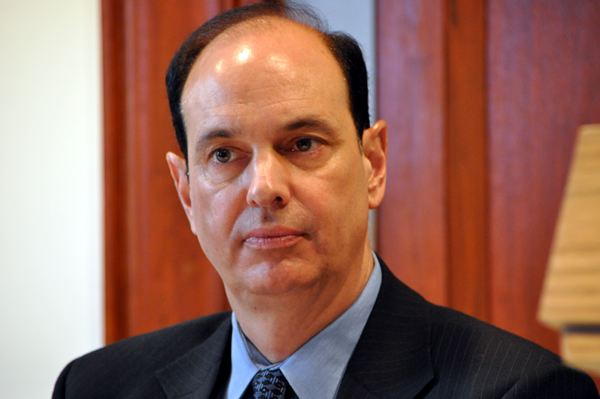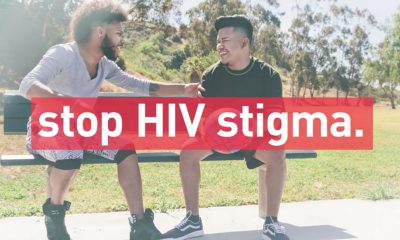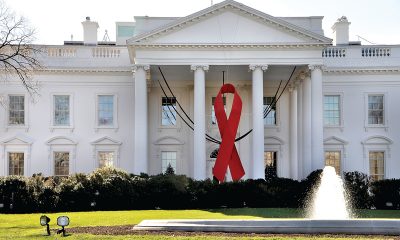National
‘Fiscal cliff’ brings fears of devastating AIDS cuts
More than 12,000 HIV patients could lose access to care next year


AIDS Institute Deputy Executive Director Carl Schmid estimated that up to 12,000 people in ADAP could lose access to care. (Blade file photo by Michael Key)
Pending across-the-board cuts to federal programs have advocates concerned that up to 12,200 people living with HIV/AIDS in the United States could lose access to drugs and programs unless Congress takes action.
The anticipated cuts, set to take effect on Jan. 2, are the result of the Budget Control Act, legislation President Obama signed last year as part of a compromise to raise the limit on the nation’s debt ceiling. It would reduce continued funding for the U.S. government in 2013 and beyond by cutting an estimated 8.2 percent in the first year from discretionary federal programs — including HIV/AIDS programs.
Carl Schmid, deputy executive director of the AIDS Institute, said unless Congress acts to institute an alternative budget, the level of funding provided would be troublesome because “people wouldn’t be able to get their drugs.”
“The sequestration wasn’t ever to occur and within three months from now, it’s going to take place unless Congress acts,” Schmid said. “It would be devastating to our programs.”
Kimberly Crump, policy officer at HIV Medicine Association, said problems are already emerging because care providers aren’t sure what level of funding will ultimately be provided.
“It really hinders them in hiring staff and making decisions around personnel, around controlling costs of labs and accepting new patients, the hours that they can be open,” Crump said. “It’s going to really start to impact availability of services.”
Estimates for what these cuts would mean for people living with HIV/AIDS have varied widely. In a letter dated Sept. 19 to Congress, the AIDS Institute says the reductions to ADAP funding could mean wait lists for drugs would once again be extended and around 9,400 patients would lose access to medication.
“This would automatically create wait lists again, and extremely long ones,” Schmid told the Blade. “But it could be even more than that, we’re doing some further analysis, so some people are saying it’s like 10,000 to 12,000 people removed from the ADAP program if this sequestration goes through.”
The number is an estimate from the Department of Health & Human Services. In a June 29 letter to Congress, Ellen Murray, HHS assistant secretary for financial resources, writes that “approximately 12,150 fewer patients” would receive benefits from the AIDS Drug Assistance Program.
A July 25 report from the Senate Health, Education, Labor & Pensions Committee similarly estimates that 12,219 people in the United States receiving drugs from ADAP would lose access to medicine. The report details how many individuals would lose access for each jurisdiction in the United States. For example, the committee estimates 199 fewer people in D.C. would have access to drugs.
In the letter to Congress, the AIDS Institute spells out the reductions to four federal HIV/AIDS programs that would result from sequestration, which amounts to a total reduction of $538 million based on calculations from fiscal year 2012 levels:
• funding for HIV prevention at the Centers for Disease Control would be cut by $64 million;
• the Ryan White HIV/AIDS Program, which provides care to low income people with the disease, would be cut by $196 million, including $77 million in cuts from the AIDS Drug Assistance Program;
• AIDS research at the National Institutes of Health would be cut by $251 million;
• and the Housing Opportunities for People with AIDS, or HOPWA, program would be cut by $27 million.
One consolation is that funds for Medicare and Medicaid would largely be immune from cuts. Medicare would only be reduced by 2 percent — and those cuts wouldn’t come from programs for patients, but providers. Medicaid, under which 50 percent of people living with HIV/AIDS receive care, won’t see any cuts.
The Washington Blade reported in August 2011 at the time President Obama signed the Budget Control Act that the legislation could impact HIV/AIDS programs, and again reported on the issue when the congressional supercommittee established by the legislation failed to provide an alternative to across the board cuts, but cost estimates for reductions weren’t previously known.
But the cuts wouldn’t only affect domestic programs aimed at providing care to people with HIV, but global programs as well, including the President’s Emergency Plan for AIDS Relief, or PEPFAR, and U.S. contributions to the Global Fund to Fight AIDS, Tuberculosis and Malaria.
Chris Collins, director of policy for amfAR, said the sequestration — commonly referred to as the “fiscal cliff” — would have a “devastating impact” on programs aimed at confronting HIV/AIDS overseas.
“It would undercut multiple aspects of the global AIDS response from treating people, which we know has a potential for saving lives, but also to preventing infection, as well as programs to help kids who are vulnerable,” Collins said. “Sequestration sets us up for seriously backtracking in response to global AIDS just at the time when we have the ability to really accelerate progress.”
In a brief published Sept. 25, amfAR provides details on the problems that reductions to global AIDS initiatives would cause. As a result of projected decreases to U.S. government bilateral support, HIV/AIDS treatments for 276,500 people wouldn’t be available, potentially leading to 63,000 more AIDS-related deaths and 124,000 more children becoming orphans. The decrease in U.S. contributions to the Global Fund would result in an additional 100,000 people not being treated for HIV/AIDS.
In addition to HIV/AIDS programs, federal initiatives that more generally serve the LGBT community would also face cuts under the sequester. The U.S. Equal Employment Opportunity Commission, which earlier this year interpreted federal law to allow it to protect transgender workers from discrimination, would face cuts as would the Justice Department’s community relations service to fight hate crimes.
Laurie Young, the National Gay & Lesbian Task Force’s director of aging and economic security, said the sequester could have an impact on local LGBT community centers that rely on funds from the federal government.
“Any programs … that are funded out of the Older Americans Act — community health programs, community health centers — any of the programs that receive any kind of federal support could be affected by it,” Young said.
Young said the cuts could also affect U.S. governmental efforts in research, including data collection efforts for LGBT people on health surveys, which the Department of Health & Human Services began to implement last year upon requests from LGBT advocates.
HIV/AIDS advocates expressed dismay that the pending defense cuts under the sequester — which would reduce the Pentagon’s budget by an estimated $54.7 billion in 2013 — have received attention in the media, but other programs haven’t received significant attention.
Crump said big ticket items like defense and Medicare have greater “political clout” behind them, which makes other programs such as HIV/AIDS more vulnerable to cuts.
“It makes the non-defense discretionary budget more vulnerable to cuts when these other big ticket items have their champions talking about fencing off or protecting them,” Crump said. “That means we’re going to have to cut more steeply into these other annually funded programs.”
Government agencies that operate programs for people with HIV/AIDS referred the Washington Blade to the White House Office of Budget & Management, which issued a report on Sept. 14 detailing the extent of cuts to government programs.
“As the administration has made clear, no amount of planning can mitigate the effect of these cuts,” the report states. “Sequestration is a blunt and indiscriminate instrument. It is not the responsible way for our nation to achieve deficit reduction.”
Amid this fear, observers were generally optimistic that Congress would institute an alternative to the Budget Control Act to avoid the cuts to HIV/AIDS and other programs.
A Senate Democratic aide, who spoke on condition of anonymity, said an agreement to avoid the sequester would likely be reached after campaign season has concluded.
“As much as we like to piss on each other’s boots and do nothing, when there’s a gun to our head, we know it’s time to do something,” the aide said.
The aide predicted a proposal similar to previously proposed bipartisan debt reduction plans — those from the Simpson-Bowles Commission, the Domenici-Rivlin Task Force or the “Gang of Six” — would be enacted.
But even if an agreement is reached, concerns persist that Congress could enact a plan that would cut into HIV/AIDS funds even more so than the Budget Control Act — especially because another agreement on the debt ceiling must be reached in February when the limit will likely be reached.
Schmid said an alternative plan that Congress might come up with could reach into currently protected programs of Medicare and Medicaid to pay for budget reduction.
“We still have to come up with these cuts, and so they are looking at different ways,” Schmid said. “But Medicare and Medicaid will be back on the table again, and we are concerned about that as well.”
Young predicted that any plan Congress would enact for deficit reduction would cut funding for government programs, but it remains to be seen where those cuts would fall.
“There’s going to be some pain somewhere because the whole reason that the sequestration was enacted and passed was because of the rampant fears about the outrageous federal deficit,” Young said. “Now I could get on my soap box with you, but the reason that the deficit is the way it is today is because we’ve had 10 or 12 years of tax cuts, and in order to pay our bills we have to have money coming in.”
And Crump said if the election results in wins for Republicans, they may feel emboldened to pass a plan similar to what House Budget Committee Chair and Republican vice presidential nominee Paul Ryan has proposed, which she said would “cut even more deeply” than sequestration.
“There’s a looming series of threats to the whole health care environment that could very much impact the hope that the Affordable Care Act held for improving HIV care and access to care for people with HIV,” Crump said.
The White House
Four states to ignore new Title IX rules protecting transgender students
Biden administration last Friday released final regulations

BY ERIN REED | Last Friday, the Biden administration released its final Title IX rules, which include protections for LGBTQ students by clarifying that Title IX forbids discrimination based on sexual orientation and gender identity.
The rule change could have a significant impact as it would supersede bathroom bans and other discriminatory policies that have become increasingly common in Republican states within the U.S.
As of Thursday morning, however, officials in at least four states — Oklahoma, Louisiana, Florida, and South Carolina — have directed schools to ignore the regulations, potentially setting up a federal showdown that may ultimately end up in a protracted court battle in the lead-up to the 2024 elections.
Louisiana State Superintendent of Education Cade Brumley was the first to respond, decrying the fact that the new Title IX regulations could block teachers and other students from exercising what has been dubbed by some a “right to bully” transgender students by using their old names and pronouns intentionally.
Asserting that Title IX law does not protect trans and queer students, Brumley states that schools “should not alter policies or procedures at this time.” Critically, several courts have ruled that trans and queer students are protected by Title IX, including the 4th U.S. Circuit Court of Appeals in a recent case in West Virginia.
In South Carolina, Schools Supt. Ellen Weaver wrote in a letter that providing protections for trans and LGBTQ students under Title IX “would rescind 50 years of progress and equality of opportunity by putting girls and women at a disadvantage in the educational arena,” apparently leaving trans kids out of her definition of those who deserve progress and equality of opportunity.
She then directed schools to ignore the new directive while waiting for court challenges. While South Carolina does not have a bathroom ban or statewide “Don’t Say Gay or Trans” law, such bills continue to be proposed in the state.
Responding to the South Carolina letter, Chase Glenn of Alliance For Full Acceptance stated, “While Supt. Weaver may not personally support the rights of LGBTQ+ students, she has the responsibility as the top school leader in our state to ensure that all students have equal rights and protections, and a safe place to learn and be themselves. The flagrant disregard shown for the Title IX rule tells me that our superintendent unfortunately does not have the best interests of all students in mind.”
Florida Education Commissioner Manny Diaz also joined in instructing schools not to implement Title IX regulations. In a letter issued to area schools, Diaz stated that the new Title IX regulations were tantamount to “gaslighting the country into believing that biological sex no longer has any meaning.”
Governor Ron DeSantis approved of the letter and stated that Florida “will not comply.” Florida has notably been the site of some of the most viciously anti-queer and anti-trans legislation in recent history, including a “Don’t Say Gay or Trans” law that was used to force a trans female teacher to go by “Mr.”
State Education Supt. Ryan Walters of Oklahoma was the latest to echo similar sentiments. Walters has recently appointed the right-wing media figure Chaya Raichik of Libs of TikTok to an advisory role “to improve school safety,” and notably, Raichik has posed proudly with papers accusing her of instigating bomb threats with her incendiary posts about LGBTQ people in classrooms.
The Title IX policies have been universally applauded by large LGBTQ rights organizations in the U.S. Lambda Legal, a key figure in fighting anti-LGBTQ legislation nationwide, said that the regulations “clearly cover LGBTQ+ students, as well as survivors and pregnant and parenting students across race and gender identity.” The Human Rights Campaign also praised the rule, stating, “rule will be life-changing for so many LGBTQ+ youth and help ensure LGBTQ+ students can receive the same educational experience as their peers: Going to dances, safely using the restroom, and writing stories that tell the truth about their own lives.”
The rule is slated to go into effect Aug. 1, pending any legal challenges.
****************************************************************************

Erin Reed is a transgender woman (she/her pronouns) and researcher who tracks anti-LGBTQ+ legislation around the world and helps people become better advocates for their queer family, friends, colleagues, and community. Reed also is a social media consultant and public speaker.
******************************************************************************************
The preceding article was first published at Erin In The Morning and is republished with permission.
Pennsylvania
Malcolm Kenyatta could become the first LGBTQ statewide elected official in Pa.
State lawmaker a prominent Biden-Harris 2024 reelection campaign surrogate

Following his win in the Democratic primary contest on Wednesday, Pennsylvania state Rep. Malcolm Kenyatta, who is running for auditor general, is positioned to potentially become the first openly LGBTQ elected official serving the commonwealth.
In a statement celebrating his victory, LGBTQ+ Victory Fund President Annise Parker said, “Pennsylvanians trust Malcolm Kenyatta to be their watchdog as auditor general because that’s exactly what he’s been as a legislator.”
“LGBTQ+ Victory Fund is all in for Malcolm, because we know he has the experience to win this race and carry on his fight for students, seniors and workers as Pennsylvania’s auditor general,” she said.
Parker added, “LGBTQ+ Americans are severely underrepresented in public office and the numbers are even worse for Black LGBTQ+ representation. I look forward to doing everything I can to mobilize LGBTQ+ Pennsylvanians and our allies to get out and vote for Malcolm this November so we can make history.”
In April 2023, Kenyatta was appointed by the White House to serve as director of the Presidential Advisory Commission on Advancing Educational Equity, Excellence and Economic Opportunity for Black Americans.
He has been an active surrogate in the Biden-Harris 2024 reelection campaign.
The White House
White House debuts action plan targeting pollutants in drinking water
Same-sex couples face higher risk from environmental hazards

Headlining an Earth Day event in Northern Virginia’s Prince William Forest on Monday, President Joe Biden announced the disbursement of $7 billion in new grants for solar projects and warned of his Republican opponent’s plans to roll back the progress his administration has made toward addressing the harms of climate change.
The administration has led more than 500 programs geared toward communities most impacted by health and safety hazards like pollution and extreme weather events.
In a statement to the Washington Blade on Wednesday, Brenda Mallory, chair of the White House Council on Environmental Quality, said, “President Biden is leading the most ambitious climate, conservation, and environmental justice agenda in history — and that means working toward a future where all people can breathe clean air, drink clean water, and live in a healthy community.”
“This Earth Week, the Biden-Harris Administration announced $7 billion in solar energy projects for over 900,000 households in disadvantaged communities while creating hundreds of thousands of clean energy jobs, which are being made more accessible by the American Climate Corps,” she said. “President Biden is delivering on his promise to help protect all communities from the impacts of climate change — including the LGBTQI+ community — and that we leave no community behind as we build an equitable and inclusive clean energy economy for all.”
Recent milestones in the administration’s climate policies include the U.S. Environmental Protection Agency’s issuance on April 10 of legally enforceable standard for detecting and treating drinking water contaminated with polyfluoroalkyl substances.
“This rule sets health safeguards and will require public water systems to monitor and reduce the levels of PFAS in our nation’s drinking water, and notify the public of any exceedances of those levels,” according to a White House fact sheet. “The rule sets drinking water limits for five individual PFAS, including the most frequently found PFOA and PFOS.”
The move is expected to protect 100 million Americans from exposure to the “forever chemicals,” which have been linked to severe health problems including cancers, liver and heart damage, and developmental impacts in children.
An interactive dashboard from the United States Geological Survey shows the concentrations of polyfluoroalkyl substances in tapwater are highest in urban areas with dense populations, including cities like New York and Los Angeles.
During Biden’s tenure, the federal government has launched more than 500 programs that are geared toward investing in the communities most impacted by climate change, whether the harms may arise from chemical pollutants, extreme weather events, or other causes.
New research by the Williams Institute at the UCLA School of Law found that because LGBTQ Americans are likelier to live in coastal areas and densely populated cities, households with same-sex couples are likelier to experience the adverse effects of climate change.
The report notes that previous research, including a study that used “national Census data on same-sex households by census tract combined with data on hazardous air pollutants (HAPs) from the National Air Toxics Assessment” to model “the relationship between same-sex households and risk of cancer and respiratory illness” found “that higher prevalence of same-sex households is associated with higher risks for these diseases.”
“Climate change action plans at federal, state, and local levels, including disaster preparedness, response, and recovery plans, must be inclusive and address the specific needs and vulnerabilities facing LGBT people,” the Williams Institute wrote.
With respect to polyfluoroalkyl substances, the EPA’s adoption of new standards follows other federal actions undertaken during the Biden-Harris administration to protect firefighters and healthcare workers, test for and clean up pollution, and phase out or reduce use of the chemicals in fire suppressants, food packaging, and federal procurement.
-

 State Department3 days ago
State Department3 days agoState Department releases annual human rights report
-

 Maryland5 days ago
Maryland5 days agoJoe Vogel campaign holds ‘Big Gay Canvass Kickoff’
-

 Politics4 days ago
Politics4 days agoSmithsonian staff concerned about future of LGBTQ programming amid GOP scrutiny
-

 District of Columbia1 day ago
District of Columbia1 day agoCatching up with the asexuals and aromantics of D.C.












